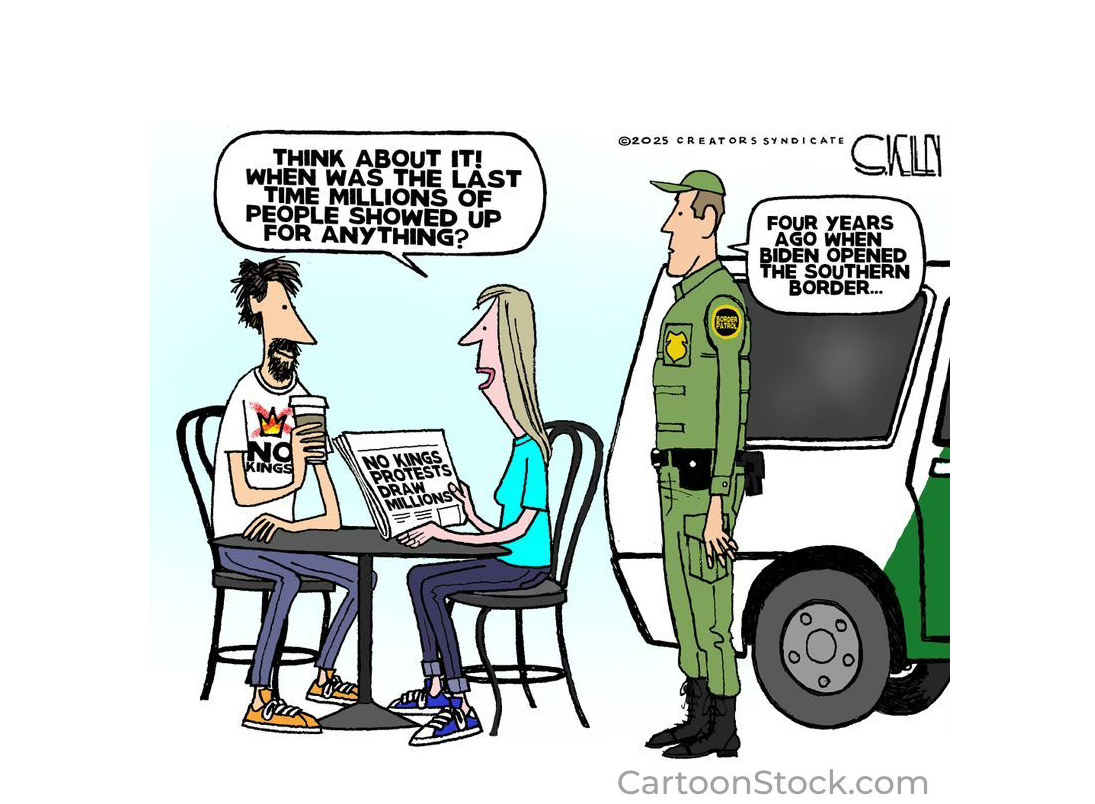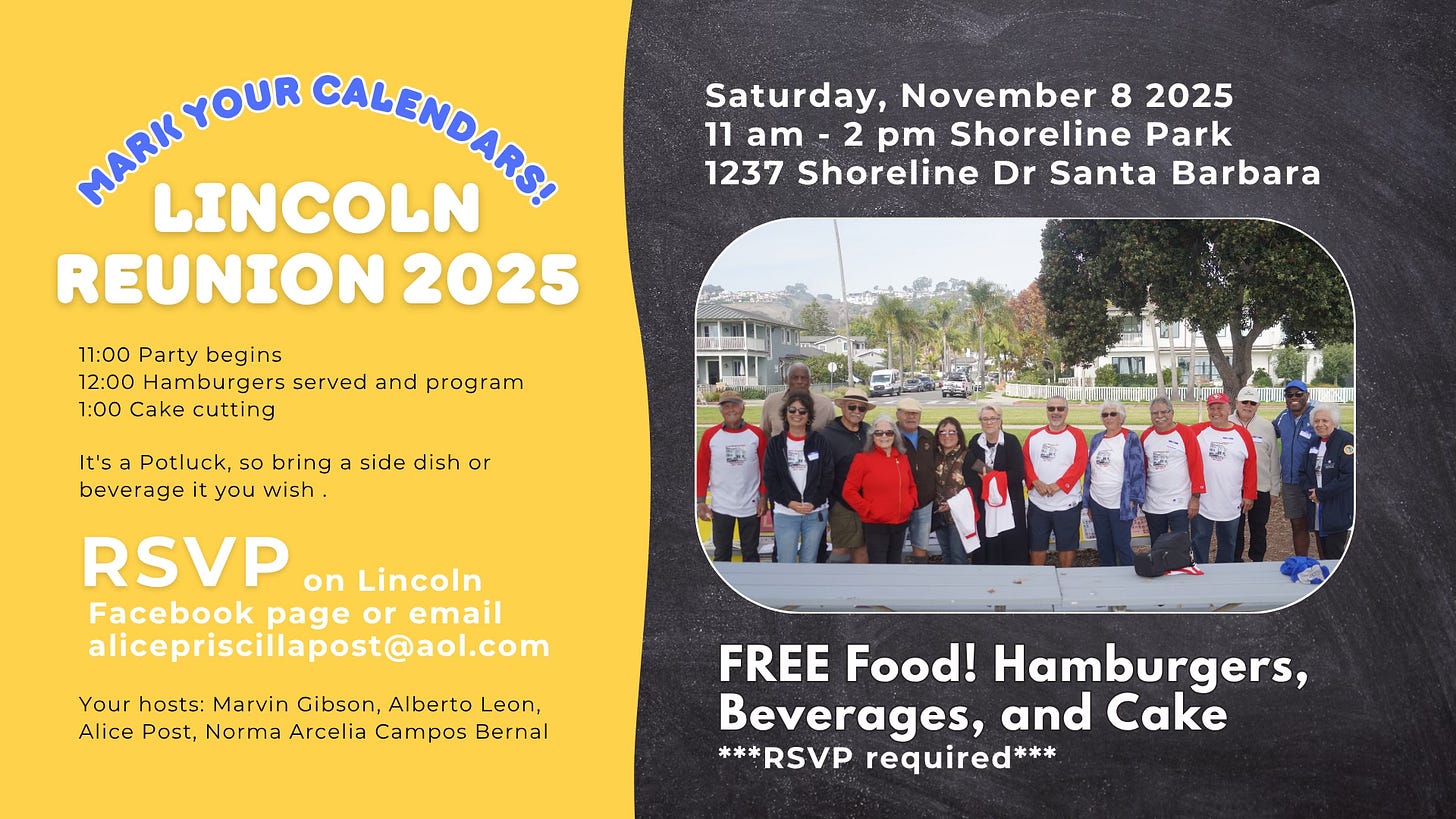I live in Santa Barbara, and to be honest, I don’t love what the city (and state) has become. The dominant worldview is wildly out of sync with my own. That reality hit home again last weekend during the latest “No Kings” protest in Alameda Park—a march aimed at Donald Trump, his immigration policies, and just about everything else that earns him the “Orange Man Bad” refrain.
It wasn’t the slogans that bothered me most. It was trying to explain them to my two small kids. As the chants echoed down Micheltorena, my five-year-old asked, “Daddy, why are all these people so mad?” My three-year-old tugged my hand and pointed at a sign that read “No Kings.” I didn’t have a neat answer. What I did know was that I didn’t want my children breathing in the anger of people who, in my view, don’t really understand what they’re protesting.
But let’s take a moment to unpack this whole “No Kings” idea.
Trump, like it or not, was elected legitimately—by both the popular vote and a solid Electoral College margin. That counts for something in a Constitutional Republic. Before someone compares President Trump to historical tyrants, it’s worth revisiting what “kingship” means in the American context.
Taxation Without Representation
The original colonies revolted against a monarchy that levied taxes on the colonists without any input from the colonists themselves. “No taxation without representation” wasn’t just a slogan—it was a demand for political agency. Fast-forward to today’s immigration system: we have over 20 million people in this country—illegal immigrants—who aren’t represented politically, yet contribute to the economy, pay taxes in some form, and access public resources. That is, quite literally, taxation without representation (Pew Research Center, 2023).
We’ve seen this imbalance before. In the early republic, Southern slave states inflated political power by counting enslaved people toward population tallies to gain more congressional seats—despite those people having no rights or vote. That distortion helped ignite the Civil War.
Today, something similar is happening. A massive population of individuals is being used to shift political power—especially in states controlled by Democrats. These states welcome illegal immigrants not purely out of compassion but because more people, even if they can’t vote, still affect congressional apportionment and federal funding.
It’s a numbers game.
And once again, it’s the vulnerable—this time, undocumented immigrants as opposed to slaves—who are used as political pawns.
If we’re honest, isn’t it more compassionate to encourage people to return to their home countries—or to enter legally through a transparent, fair process—rather than live in the shadows? Many work for below-market wages under dangerous conditions. And a significant portion of their earnings—however small—is sent abroad, money that could otherwise strengthen local U.S. economies.
Perverse Incentives Abound
Some argue, “Americans don’t want those jobs.” Maybe. But that’s not the whole story. The real barriers to hiring citizens are complex regulations, mandated benefits, minimum-wage laws, and compliance costs that make it expensive to employ legal workers. As economist, Thomas Sowell has pointed out, minimum-wage laws often harm low-skilled workers by pricing them out of the job market (Hoover Institution). These rules create perverse incentives: employers cut corners, hire under the table, and everyone loses—except the politicians who claim moral high ground while building power on the backs of the powerless.
Which brings me back to Trump.
For all the accusations of authoritarianism, he was one of the few presidents to actively reduce the size and scope of the federal government. That’s not the move of a king—it’s closer to what the Founders envisioned: a leaner federal structure with more autonomy and accountability at the local level.
So no, Trump’s immigration policy isn’t cruel or dictatorial. It is a hard-headed acknowledgment of a broken system that exploits both the undocumented and the native-born.
Enforcing the law isn’t tyranny—it’s justice.
And let’s be honest: if anyone’s acting like a king, it’s any politician who rules by objecting to federal law, advancing bureaucratic bloat, and implementing identity politics—consolidating power while claiming moral superiority.
That’s not representation.
That’s manipulation.
The “No Kings” protesters might think they’re fighting tyranny, but in truth they’re defending a structure that uses human beings as statistical leverage. That’s the real cruelty. The Founders understood that liberty requires accountability—without it, democracy curdles into hypocrisy. True compassion means creating conditions where people can rise honestly, not where they’re exploited to prop up moral vanity.
Maybe “No Kings” protesters should start with a hand-held mirror.
Community Calendar:
Got a Santa Barbara event for our community calendar? Fenkner@sbcurrent.com






Thank you, Cole. I've been in Santa Barbara since 1961 and while I also dislike the way it and the state are now governed, I still love it. I've also seen it go through enough political changes to not despair. I'm also a fan of Thomas Sowell and “The Vision of the Anointed” sums up what you describe at the No Kings. And I'm quite certain the Dems will have their gerrymandering way with Prop 50 — only I think it's going to backfire on them. My heroine of the moment is Katie Porter because she is singlehandedly showing how psycho the Democratic Party has become. And in a way you or I would never be able to because she embodies it as a Democrat! Yay, Katie! Let your Borderline Personality Disorder flow! You go, girl. You will turn every gerrymandered district so red it'll light up the skies!
Very well thought out article, nice of you to take the time to voice your opinion. I never thought of the No Taxation without representation when it comes to illegals working and paying taxes. I also agree that Trump was fairly elected and most of the country does not think the same as the majority of Californians do. Please keep writing,